All families are different, yet the main principle almost always remains the same. We take care of our family members because we love them, because “family” means helping each other in times of need. However, a mother-in-law fromthis post on the AITA subredditdoesn’t seem to think that way.
She prompted her son and daughter-in-law to cover the expenses of cleaning, while they were both at the hospital welcoming their newborn son. The new mom asked the internet whether she’s the AH for refusing to pay because, after all, no one asked the MIL to clean. And even if they did, shouldn’t she, as a family member, help them in a difficult time out of kindness?

Image credits:aliona2194 (not the actual photo)
This new mom asked the internet whether she was wrong not to pay her MIL for cleaning the house while she was giving birth at the hospital
The married couple only asked the MIL to look after the dogs, but she decided to clean the house. Now she’s asking for reimbursement

Image credits:KostiantynVoitenko (not the actual photo)
The couple sends the MIL a text saying they don’t intend to pay her, she calls them “ungrateful”

Image credits:Vladdeep (not the actual photo)
Image source:Unlikely-Visitor
Providing unsolicited help and then demanding payment for it can be a sign of toxic behavior

Imgae credits:Karolina Grabowska (not the actual photo)
Let’s face it, relationships with in-laws are almost never ideal. It’s no surprise for anyone who’s ever been married that mothers-in-law can often be difficult towards their sons or daughters-in-law. When you’re dealing with a difficult MIL, it’s helpful to look for signs of possibly toxic behavior.
What’s important when dealing with a difficult mother-in-law is to understand where she might be coming from. However hard that may sound. Toxic behavior most likely stems from the MIL’s individual issues.
Licensed marriage and family therapist Jennifer Freed tellsHella Life: “People who attach strings to kind deeds don’t really believe others will love them unless they have to. Somewhere along the line, they learned that bribery might sustain a relationship.”
She says it’s important to let the MIL know that you’re always grateful for help, but it’s also crucial to let her know that such behavior makes you feel like you’re in a brokerage, not a family.One way to avoid this in the future is to spend time with the in-law in a setting where there are no strings attached. It’s important to let the person know you value them not for the help they’re providing, but for what they are.
Toxic MILs can also gossip about you to extended family and friends, in an effort to undermine your voice in the community

Image credits:Marília Castelli (not the actual photo)
Toxic mother-in-laws also tend to gossip. And not just to their friends – to other members of the extended family as well. “This may be her method of trying to spread her version of you as truth, and once again manipulate a situation,” Trisha Johnson writes forChoosing Therapy.
Clinical psychologist Dr. Bethany Cook toldPureWowthat the worst kind of gossiping is when the MIL weaponizes information against you. In such an instance, she might “paint you in a negative light while she is the hero”, while also undermining “your standing in the community [or] family system.”
How to deal with a mother-in-law that expects money for her help and then turns your family against you when she doesn’t get what she wants?

Image credits:Mikhail Nilov (not the actual photo)
As in any relationship, psychologists recommend straightforward communication. A couple should clearly communicate to their in-laws what is on and off the table. It’s always important to set clear boundaries upfront, not after an altercation. A couple should act as a united front – you and your partner should agree on what you consider to be appropriate behavior and be consistent with it.
Not taking it personally is another useful tip. “Recognize that your mother-in-law is who she is. It’s likely that you are just a trigger and her bad behavior is a result of unfortunate experiences from her past,” Trisha Johnson writes forChoosing Therapy.
Dr. Bethany Cookaddsto this idea: “how others react to us has more to do with them than you.” Keep in mind that there’s little you can do to change someone’s behavior. What you can change is the way you react and respond to it. Cook advises to reframe “your perspective and expectations of what it is you want, need and will get from your relationship with MIL.”
The commenters defend OP saying she’s not the AH, and OP thanks them for the support
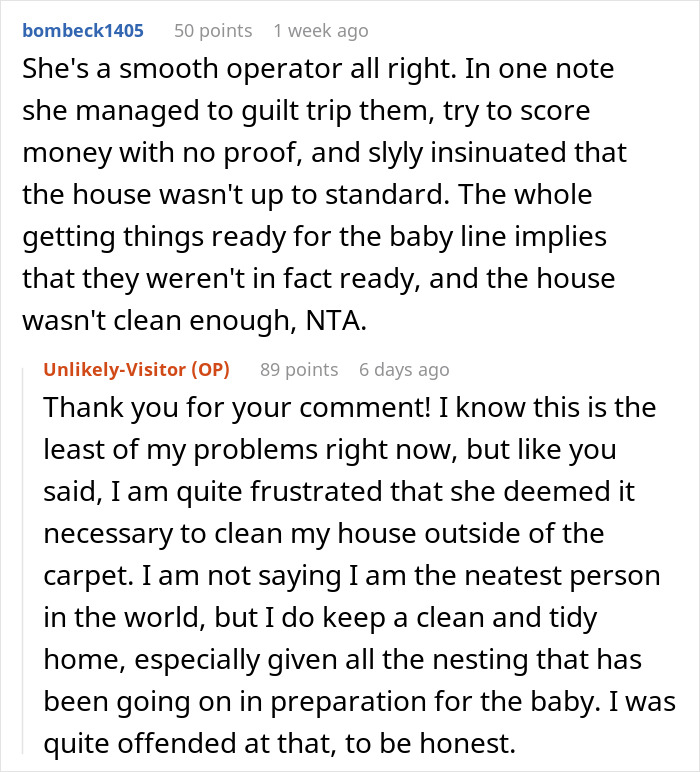
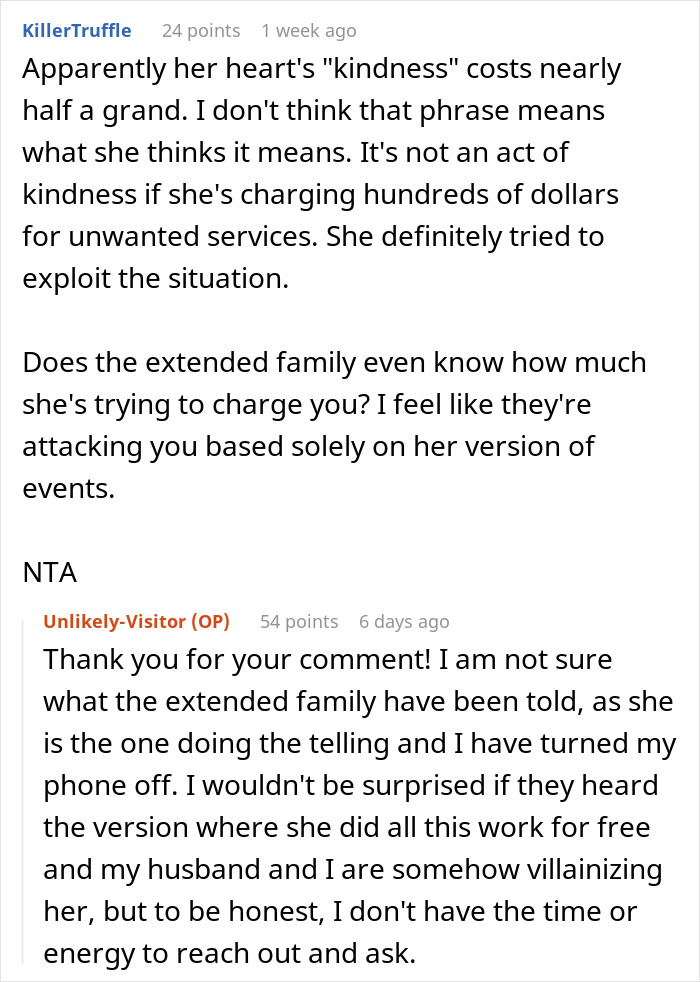
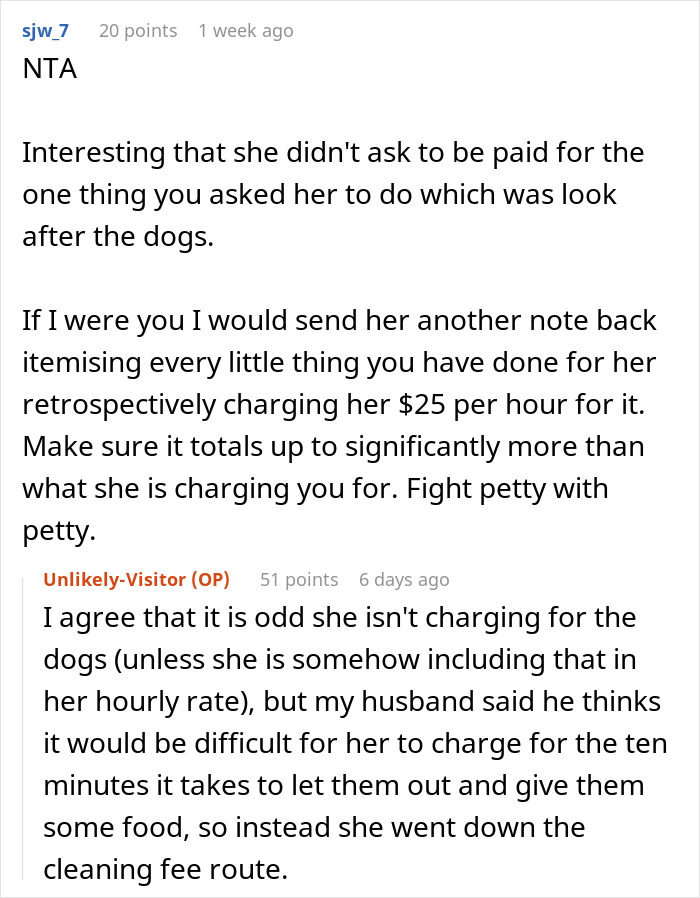

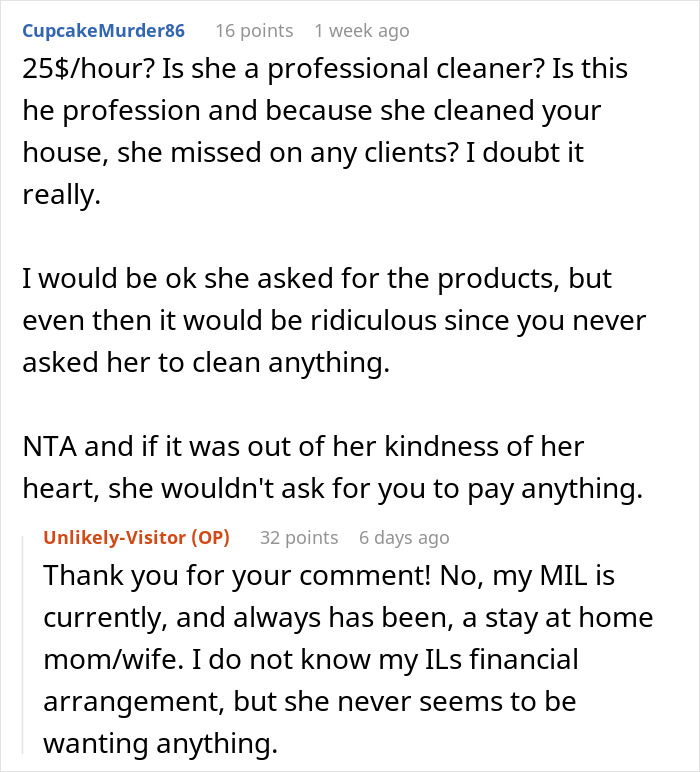
The general consensus is NTA: the MIL shouldn’t ask for payment if she truly did it “out of the kindness of her heart”
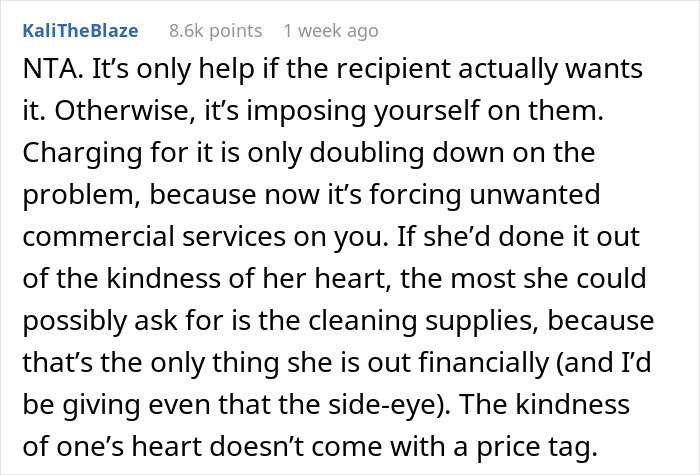



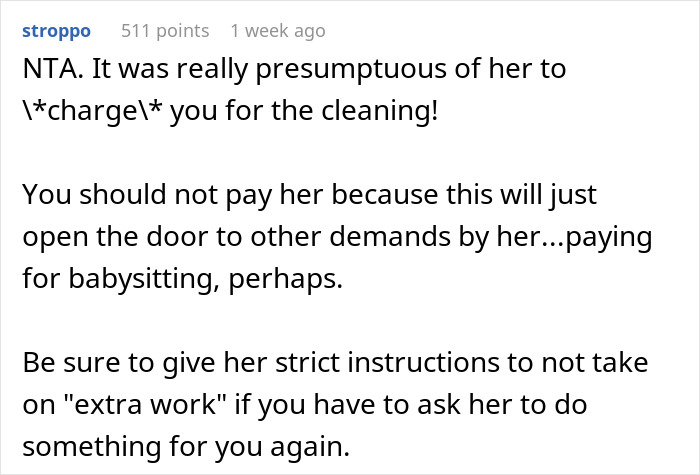 You May Like“You’re Really Gonna Make Me Do This?”: Woman Bursts Into Tears Over Son’s GF’s “Petty” House RuleGabija SaveiskyteDIL Bewildered And Hurt To Find Out She’s Been Excluded From MIL’s Weekly Lunches For A YearDenis KrotovasMan Accuses “Terrible” Sister Of Prioritizing Her Dog’s Life Over His Career, Family AgreesGabija Palšytė
You May Like“You’re Really Gonna Make Me Do This?”: Woman Bursts Into Tears Over Son’s GF’s “Petty” House RuleGabija SaveiskyteDIL Bewildered And Hurt To Find Out She’s Been Excluded From MIL’s Weekly Lunches For A YearDenis KrotovasMan Accuses “Terrible” Sister Of Prioritizing Her Dog’s Life Over His Career, Family AgreesGabija Palšytė
Gabija Saveiskyte
Denis Krotovas
Gabija Palšytė
Relationships